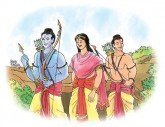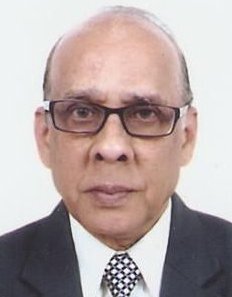The moral side of Ramayana-3: Dr A Sreekumar Menon

On the way they passed through a bushy groove where hermits did penance and saw a desert of horrifying nature. The place was literally burning with scorching sun and littered with carcasses of animals dead due to pangs of thrust .Ghandharvas or semi -gods, Sunanda and his wife Thataka and two of their sons Mareecha and Subahu were living there. Mareecha and Subahu being avaricious devastated the entire forest and preyed on all the creatures. Devastation or over exploitation of nature which sustains life on earth is shown here as most devilish act. It is unpardonable crime committed against humanity as a whole. We find sages nurturing nature and building their Ashrams in places of thick forests and banks of rivers, which were perennial sources of water. In fact they worshiped nature. In our most ancient texts Vedas, we find hymns about sun ,moon , stars, wind , trees , rivers , mother earth , water , rain and other natural phenomena . In our epics like Ramayana and Mahabharata, copious accounts are given about forests, mountains, rivers, trees, birds and animals and so on, all of which play their part in making life wholesome.
Other demons other than those referred above, were hiding in the bottom of sea. Sage Agastya responding to Lord Indra’s appeal to save Gods, sucked water in the ocean and made it dry. The whole place which was once fertile became barren. He also cursed Sunanda and his family for their devastation. They lost their semi-divine status and turned into mean creatures called demons. Their sons deserted the place. Only their daughter Thataka continued to stay there. She was ferocious. She attacked and killed who so ever came on her way .She never allowed hermits for their prayers apprehending that they might attain power through their penance to challenge her.
Here we find semi -gods losing their nobility and turning into monsters of mean character due to their evil deeds .Here the moral is that we should live meritoriously to be eligible for god’s blessings. If we commit sins, we may take birth as ruthless beings and lead a life of self- destruction.
Lord Rama restored the originality of the place with water and abundant greenery, as the very mission of his life was engaging in acts of goodness.
Thataka appeared there as if from nowhere, ready to pounce upon them. She had a gruesome look. Her eyes spit fire. Her mouth was wide open with jaws .She raised her weapon, trident; thundered and was ready to charge them. Rama, considering her as women and unethical to harm her, hesitated to counter attack her. Sage Viswamitra advised him that though she was women, being demonic, she did not deserve the protection given to women. Fierce fighting started between Rama and Thataka. Finally Rama’s arrow pierced her throat and she fell dead. This incident shows that it is the duty of all men of virtues not to close his eyes to injustice and evils perpetrated by people who ever they may be. We should fight against those evils and restore virtues no matter how risky our lives could be. The people who let lose evils are enemies of the society and they are to be routed out for safety of life. Whenever we see that some injustice being done, we should stick out our neck and fight against it, even if we are not personally affected by the acts of injustice.
Another note worthy point is that Rama and Lakshmana who were to lead a princely life ,lead a very hard life in their journey in the forest .Hard life rather than easy going life toughens us and make us endure any hardships . Children should be put to hard life rather than providing them with cozy life and too much parental attention. Some parents over protect their children that they fail to grow into emotionally matured adults. Others neglect their children and deprive them of parental love, with the result, they become anti-social elements .When we lead a frugal life, we enjoy better whatever comforts are with our reach. There is an adage that a rich man does not know the value of money as much as a poor man. There is an adage in Malayalam’Dharadrya mendennu arijavarke , paril paraklesha vivekamullu ‘ meaning only those who suffered from poverty can appreciate hardships experienced by fellow poor people , empathize with them and compassionate towards them .Those who lead a cozy life may not understand the sufferings of less fortunate brethren .So a little amount of suffering tempers one’s personality and makes him more realistic in his life.
Viswamitra along with Rama and Lakshmana reached his hermitage. He along with other sages started yagna or sacrifice .The Demons gathering in the sky started spoiling their worship. Rama shot an arrow and created an umbrella to shield the rites from being defiled by Demons .The two Demons Subhahu and Mareecha , sons of Thataka, whom Rama had killed attacked Rama and Lakshmana to avenge the death of their mother in the hands of Rama .But Rama killed both of them . Other Demons had to flee for their safety. Thus Viswamitra completed the ritual successfully. Here a human tendency is depicted. When some actions are proposed, we find there are people who oppose it without rhyme and reason, instead of concurring with it and extending co-operation . It is because of their tendency for opposition rather than co-operation. They find pleasure in opposing and they think that is the way to show their superiority. It happens actually due to their weakness and feelings of insecurity. We should work against such tendency; try to see the merits in what others say and accept those that are worth accepting. It is a positive attitude of mind, by which all stands to gain. We find political parties vying with each other by taking to such strategies to retain power at the cost of the welfare of the people with whose mandate they rule. Any constructive suggestions coming from which ever quarters should be accepted. In fact we should look for and encourage valuable ideas .In other words such openness of mind is to be cultivated.






